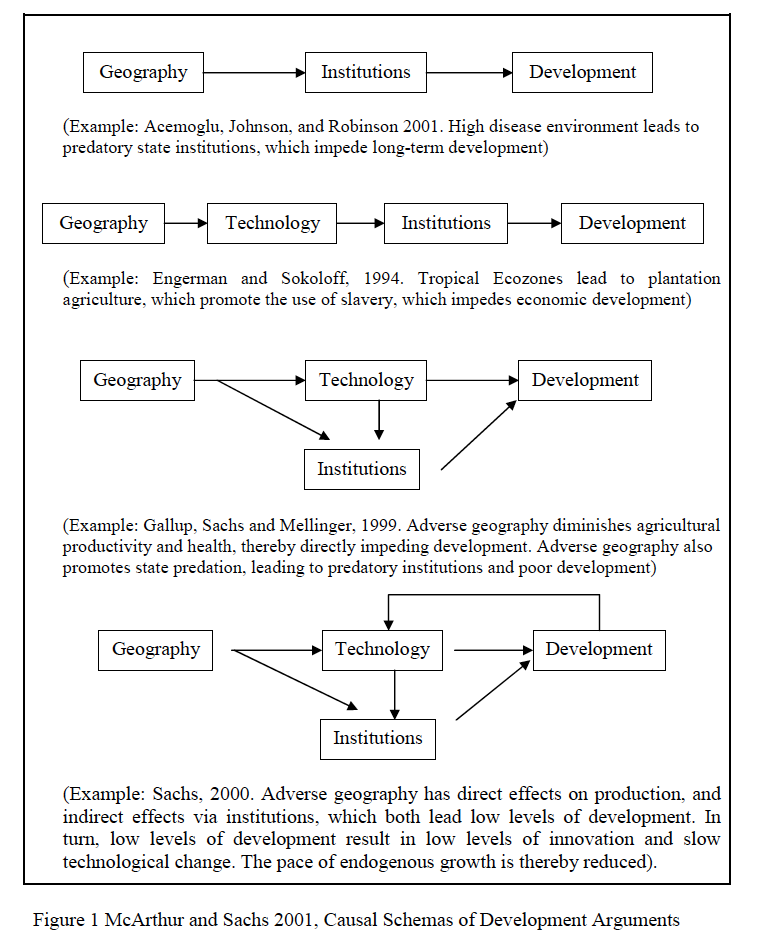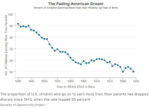The recent divergences between Northern states of the euro zone and the peripheral ones helped to a resurgence in geographical and social theories for economics.
Geographic determinism is the theory that the human habits and characteristics of a particular culture are shaped by geographic conditions. Coined by Ellsworth Huntington, the theory looked at the rise and fall of the Roman Empire from 400-500. Much of the fall of the empire had to do with a regional drought which decreased the fertility of the land and agriculture output. The lack of food from this event strained the empire and exacerbated the political situation to the point of collapse. Professor Jared Diamond extrapolates the theory in his Pulitzer Prize-winning work Guns, Germs, and Steel.
The theory has grown to encompass all environmental and geographic conditions and their impact on the social, political and economic forces of a society. Technology is seen as the only way to mitigate risks associated with geographic determinism.
One of the academical leaders for geographical factors in sociology and economics is Clint Ballinger.
Why Geographic Factors are Necessary in Development Studies
Abstract: This paper proposes that the resurgence of geographic factors in the study of uneven development is not due simply to the recurrent nature of intellectual fashions, nor necessarily because arguments that rely on geographic factors are less simplistic than before, nor because they avoid racialist, imperialistic, and deterministic forms they sometimes took in the past. Rather, this paper argues that geographic factors have been turned to once again because they are an indispensable part of explanation, playing a special role that has not been properly understood, a role especially crucial for the explanation of the inherently spatial questions that development studies seek to address. The paper is made up of two sections and an appendix. The first section discusses why geographic factors are necessary for explanations of uneven development with a brief example from the ‘institutions versus geography’ debate. The second section discusses why the reflexive rejection by social scientists of geographic and environmental factors is misguided, with a separate note on geography and geographers. The ideas in this paper were in part arrived at inductively while surveying instances where social scientists in some way attempt to account for real-world locations/distributions of social phenomena (as opposed to discussing a social theory or process aspatially or with its distribution taken as a starting point). A number of these are included with discussion as an appendix.
Ballinger 2008 d discusses ethical concerns by social scientists with determinism more generally, many of which are expressed with geographic determinism in mind. The aversion to suggesting geographic factors are causal in human affairs is deeply embedded in social scientific thought. However, it may be that it is precisely the absence of geographic factors in the analysis of development outcomes that has allowed many morally suspect ideas concerning development to linger. Ignoring geography means imagining a uniform world with no differentiation in physical characteristics (this is usually implicit rather than explicit in the spatial work of much social science). It is hard to imagine by what mechanism
In such a world, for the millennia that humans have been organizing socially and developingculturally, there would be little reason for trade, as there would be no difference in access to or types of resources, little reason to migrate or travel, as everywhere would be the same, little reason to adapt or innovate any differently than one’s neighboring communities. This is the world implicitly assumed when geography is ignored. However, in one way or another social scientists and historians do fall back on social variation to explain variations in economic and political organization. Explanations of differences in material well-being often have at their root the idea that either:
1) there is some deficiency in the culture, such as low ‘social capital’ or ‘amoral familism’13, or a religion that fails to foster a work ethic, or a lack of institutions that internalize externalities and create incentives or
2) the culture is the victim of oppression or exploitation.
These two basic ideas cover the spectrum of right (‘It’s their fault’) and left
(dependency theories, postcolonialism). Hybrid theories can also be constructed, such
as blaming a lack of institutions or social capital on some earlier period of oppression
and exploitation (e.g. Putnam 1993).
Even mainstream leader Paul Krugman said:
in many cases, aspects of natural geography are able to matter so much not
because natural features of the landscape are that crucial, but because they
establish seeds around which self-reinforcing agglomerations crystallize. So it is
precisely the aspects of the economy that in principle allow history-dependent,
multiple equilibria stories to be told that in practice give exogenous geography
such a strong role. (Krugman 1998, 24)
| Ballinger Clint 2011 Why Geographic Factors are Necessary in Development Studies pdf |
| View more ebooks on ebookbrowse.com |
The following extracts shows papers that proved the dependency of development on geographical factors.
See more for

















1 comment
Clint Ballinger
2012-10-14 at 15:31 (UTC 2) Link to this comment
Hello – I was pleasantly surprised to run across your interesting website with good stuff on Post Keynesianism, Kindleberger etc. and find a page on my work – flattered! Thank you.
I have started a project on problems with orthodox economics and the social sciences more generally you may be interested in – ACADEMIC SCRIBBLERS: SOCIAL SCIENCE AND ITS CRITICS at http://open.salon.com/blog/clintballinger
I will now spend some time reading the rest of the economic theory pages you have on your site.
Kind regards,
Clint Ballinger